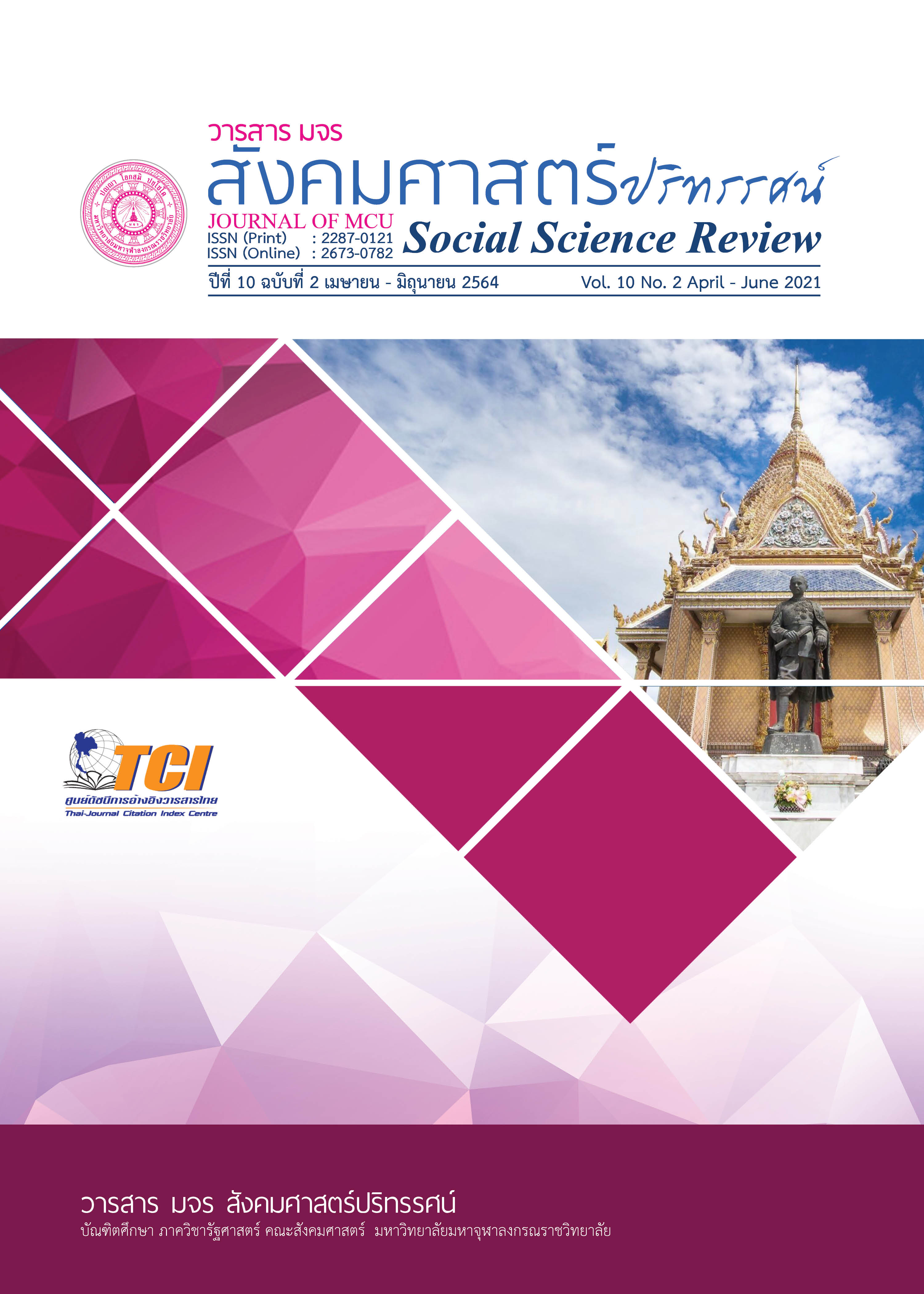การสร้างทัศนคติเชิงบวกในการทำงานตามหลักพระพุทธศาสนา
คำสำคัญ:
การสร้างทัศนคติเชิงบวก, การทำงาน, พระพุทธศาสนาบทคัดย่อ
ทัศนคติเชิงบวก คือ ทัศนคติที่ชักนำให้บุคคลแสดงออกมีความรู้สึกหรืออารมณ์จากสภาพจิตใจ โต้ตอบด้านดีต่อบุคคลหรือเรื่องราวใด ๆ เรื่องราวหนึ่ง รวมถึงหน่วยงาน องค์กรสถาบัน และการดำเนิน กิจการขององค์กร และอื่น ๆองค์ประกอบที่นำมาใช้ในการสร้างทัศนคติที่ดีที่ผู้เขียนได้รวบรวมคือ“หลักธรรม” ได้แก่ 1) พรหมวิหาร 4 2)อิทธิบาทธรรม 4 3)เว้นอคติ 4// “ปัจจัยที่ก่อให้เกิดทัศนคติเชิงบวก” ได้แก่ 1)ครอบครัวที่ดี 2)ความรู้ความสามารถ 3)ประสบการณ์ 4)ปัญหาในชีวิตที่ผ่านมาได้ 5)วัฒนธรรมในองค์กร ฯลฯ //“ประสิทธิภาพในการทำงาน” ได้แก่ 1)การแสดงออกในการทำงาน 2)มีปฏิสัมพันธ์ 3)โอกาสในความเจริญก้าวหน้า 4)จิตใจเข้มแข็งในการทำงาน ฯลฯ //“ทัศนคติเชิงบวก” ได้แก่1)การทำงานอย่างตั้งใจ 2)ไม่สร้างความเสียหายแก่องค์กร 3)ยึดหลักธรรมทางพระพุทธศาสนา ซึ่งการจะมีทัศนคติที่ดีในการทำงานนั้น สำคัญต้องพัฒนาด้านจิตใจตามหลักพระพุทธศาสนา โดยอาศัยปัจจัยรอบด้านเพื่อให้เกิดความรู้และสร้างความเข้มแข็งในการทำงานจะเกิดเป็นทัศนคติที่ดีและสามารถทำงานอย่างมีประสิทธิภาพ
เอกสารอ้างอิง
ธงชัย สันติวงษ์. (2540). พฤติกรรมผู้บริโภคทางการตลาด. กรุงเทพฯ: ไทยวัฒนาพานิช.
บุญชม ศรีสะอาด. (2555). วินัยในตนเอง. วารสารการวัดผลการศึกษา,17(1), 3–15.
พระธรรมโกศาจารย์ (ประยูร ธมฺมจิตฺโต). (2551). ทำอย่างไรจึงจะเรียนเก่ง. กรุงเทพฯ: โรงพิมพ์มหาจุฬาลงกรณราชวิทยาลัย.
มหาจุฬาลงกรณราชวิทยาลัย. (2539). พระไตรปิฎกฉบับภาษาไทย ฉบับมหาจุฬาลงกรณราชวิทยาลัย. กรุงเทพฯ: โรงพิมพ์มหาจุฬาลงกรณราชวิทยาลัย.
วิมุตาพร บริบูรณ์ลาภผลิน และ สุวิญ รักสัตย์. (2562). การแก้ไขปัญหาอคติในสังคมไทยด้วยพุทธบูรณาการ. วารสารวิชาการ, 6(2), 212.
วีราภรณ์ บุตรทองดี. (2557). การศึกษาทัศนคติต่อการทำงาน องค์กร และความจงรักภักดีของพนักงานที่ส่งผลต่อประสิทธิผลการปฏิบัติงานของพนักงานโรงงาน ในเขตนิคมอุตสาหกรรม จังหวัดปทุมธานี (การค้นคว้าอิสระปริญญาบริหารธุรกิจมหาบัณฑิต). ปทุมธานี: มหาวิทยาลัยกรุงเทพ.
สมพร เทพสิทธา. (2542). คุณธรรมและจริยธรรม. กรุงเทพฯ: สภาสังคมสงเคราะห์แห่งประเทศไทยในพระบรมราชินูปถัมภ์.
อดุลย์ จาตุรงคกุล. (2543). กลยุทธ์การตลาด. กรุงเทพฯ: มหาวิทยาลัยธรรมศาสตร์.
อนุชิต เที่ยงธรรม. (2545). พฤติกรรมผู้บริโภค. กรุงเทพฯ: แอมเบอร์แอดแอนด์อินทีเรีย.
Litwin, G. H., & Stringer, Jr. R. A. (1968). Motivation and organizational climate. New York: McGraw-Hill.
Rosenberg, M. J., & Hovland, C. I. (1960). Cognitive, Affective, and Behavioral Components of Attitudes. Attitude Organization and Change: An Analysis of Consistency Among Attitude Components.
ดาวน์โหลด
เผยแพร่แล้ว
รูปแบบการอ้างอิง
ฉบับ
ประเภทบทความ
สัญญาอนุญาต
ลิขสิทธิ์ (c) 2021 วารสาร มจร สังคมศาสตร์ปริทรรศน์

อนุญาตภายใต้เงื่อนไข Creative Commons Attribution-NonCommercial-NoDerivatives 4.0 International License.
เพื่อให้เป็นไปตามกฎหมายลิขสิทธิ์ ผู้นิพนธ์ทุกท่านต้องลงลายมือชื่อในแบบฟอร์มใบมอบลิขสิทธิ์บทความให้แก่วารสารฯ พร้อมกับบทความต้นฉบับที่ได้แก้ไขครั้งสุดท้าย นอกจากนี้ ผู้นิพนธ์ทุกท่านต้องยืนยันว่าบทความต้นฉบับที่ส่งมาตีพิมพ์นั้น ได้ส่งมาตีพิมพ์เฉพาะในวารสาร มจร สังคมศาสตร์ปริทรรศน์ เพียงแห่งเดียวเท่านั้น หากมีการใช้ภาพหรือตารางหรือเนื้อหาอื่นๆ ของผู้นิพนธ์อื่นที่ปรากฏในสิ่งตีพิมพ์อื่นมาแล้ว ผู้นิพนธ์ต้องขออนุญาตเจ้าของลิขสิทธิ์ก่อน พร้อมทั้งแสดงหนังสือที่ได้รับการยินยอมต่อบรรณาธิการ ก่อนที่บทความจะได้รับการตีพิมพ์ หากไม่เป็นไปตามข้อกำหนดเบื้องต้น ทางวารสารจะถอดบทความของท่านออกโดยไม่มีข้อยกเว้นใดๆ ทั้งสิ้น





